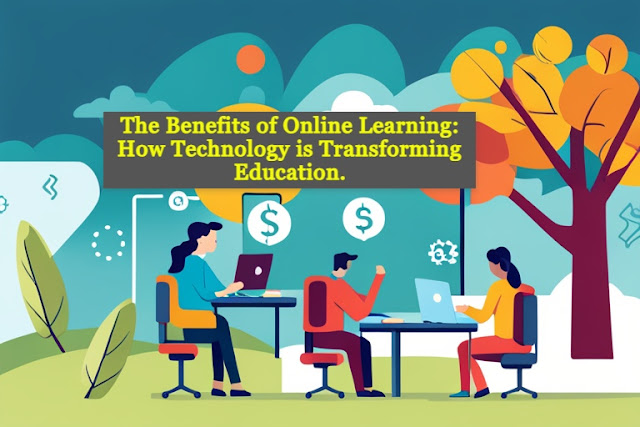In recent years, technology has revolutionized various aspects of our lives, and one area that has experienced significant transformation is education. Online learning, also known as e-learning, has emerged as a powerful tool in the educational landscape, offering numerous benefits for both students and educators. With the proliferation of internet access and the advancement of digital tools, online learning has become increasingly accessible and effective. In this article, we will explore the advantages of online learning and how technology is transforming education.
Flexibility and Accessibility:
One of the most significant benefits of online learning is the flexibility it provides. Traditional classroom settings often require students to adhere to rigid schedules, making it challenging for individuals with other commitments such as work or family obligations. Online learning allows students to access course materials and lectures at their convenience, enabling them to create a personalized learning schedule that fits their needs. This flexibility is particularly advantageous for non-traditional learners, such as adult students or those in remote areas, who may face obstacles in attending physical classes.
Furthermore, online learning promotes accessibility by eliminating geographical barriers. With the internet, students can access educational resources from anywhere in the world. This opens up a world of opportunities for individuals in underserved areas or those who cannot physically attend educational institutions. Online courses also cater to students with disabilities, providing accommodations and alternative formats for learning materials, ensuring inclusivity and equal access to education for all.
Diverse Learning Formats:
Online learning offers a wide range of learning formats that cater to different learning styles. Through multimedia elements such as videos, interactive quizzes, and gamified content, students can engage with the material in a variety of ways. This diversity in learning formats enhances understanding and retention, as students can choose the methods that work best for them. Additionally, online learning platforms often incorporate collaborative tools, allowing students to interact with their peers and participate in group projects virtually, fostering a sense of community and teamwork.
Personalized Learning Experience:
Technology in online learning enables personalized learning experiences tailored to individual needs and preferences. Adaptive learning systems use algorithms to assess a student's progress and provide customized recommendations and feedback. This individualized approach helps students focus on areas where they need improvement and progress at their own pace. Personalized learning not only boosts student engagement but also promotes better knowledge retention and academic performance.
Lifelong Learning and Skill Development:
Online learning has become a valuable resource for lifelong learning and skill development. With rapidly evolving industries and technological advancements, continuous learning has become crucial to remain competitive in the job market. Online courses offer opportunities for professionals to upskill or reskill, allowing them to stay relevant in their fields or explore new career paths. The flexibility of online learning enables individuals to pursue education while working, making it easier to balance professional and personal responsibilities.
Cost-Effectiveness:
Online learning often proves to be more cost-effective compared to traditional education. It eliminates the need for commuting, accommodation, and expensive textbooks, resulting in significant savings. Many online courses and educational platforms also offer free or affordable alternatives, making education more accessible to a broader audience. Furthermore, online learning reduces the strain on educational institutions, as it can accommodate larger numbers of students without the need for additional physical infrastructure.
Global Networking and Collaboration:
Online learning breaks down geographical barriers and creates opportunities for global networking and collaboration. Students from different parts of the world can interact, exchange ideas, and work on projects together. This exposure to diverse perspectives and cultures enhances the learning experience and fosters a global mindset. Furthermore, online platforms often connect learners with industry professionals, mentors, and experts, enabling valuable networking opportunities that can lead to internships, job placements, or collaborations.
In conclusion, online learning, powered by technology, has revolutionized education in numerous ways. Its flexibility, accessibility, and diverse learning formats make it a compelling alternative to traditional classroom settings. The personalized learning experience, emphasis on lifelong learning, cost-effectiveness, and global networking opportunities further contribute to its appeal. As technology continues to advance, online learning will undoubtedly play a pivotal role in transforming education and making quality learning experiences accessible to a wider audience.








No comments:
Post a Comment